UK
Why Rishi Sunak is backing away from the 2030 petrol car banMatt Oliver
THE TELEGRAO]PH
Mon, 24 July 2023
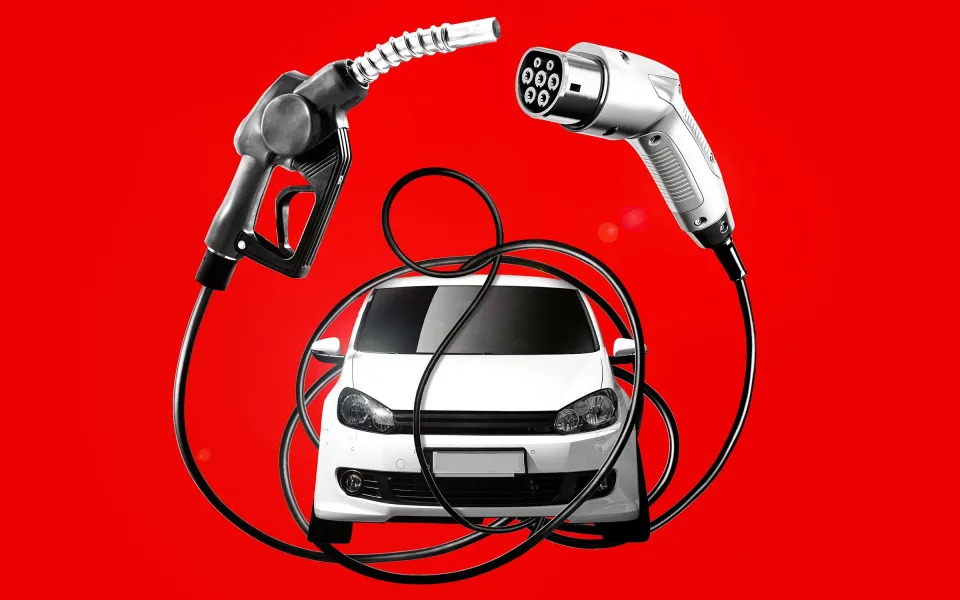
Net Zero Electric Car
With Tory backbenchers demanding a rethink on Britain’s net zero policies, Rishi Sunak gave a less than convincing answer when challenged over one of the Government’s signature pledges.
A ban on the sale of new petrol and diesel cars is due to come into effect from 2030, having been announced with much fanfare by the Prime Minister’s predecessor Boris Johnson.
But when asked whether he would stand by the plan on Monday, Mr Sunak equivocated.
“Of course net zero is important to me,” he said. “So yes we’re going to keep making progress towards our net zero ambitions and we’re also going to strengthen our energy security.
“I think the events over the last year or two have demonstrated the importance of investing more in home-grown energy, whether that’s more nuclear or offshore wind. I think that’s what people want to see and that’s what I’m going to deliver.”
The comments have set the set the stage for a major U-turn, although Downing Street has insisted the 2030 ban remains official policy.
It is the latest twist in a saga going back to Mr Johnson’s premiership.
With a year to go before Britain hosted the Cop26 climate conference, Boris Johnson was preparing to make an eye-catching announcement.
The then-prime minister was poised to set out his 10-point plan to spark a green industrial revolution – and the centrepiece was a vow to ban the sale of new petrol and diesel cars by 2030.
A highly ambitious target, this was five years sooner than the deadline he had set just nine months earlier, which car industry bosses dismissed as “a date without a plan”.
It was also a decade before the target outlined by his predecessor, Theresa May, only two years beforehand.
“Our green industrial revolution will be powered by the wind turbines of Scotland and the northeast, propelled by the electric vehicles made in the Midlands and advanced by the latest technologies developed in Wales, so we can look ahead to a more prosperous, greener future,” Mr Johnson said in November 2020.
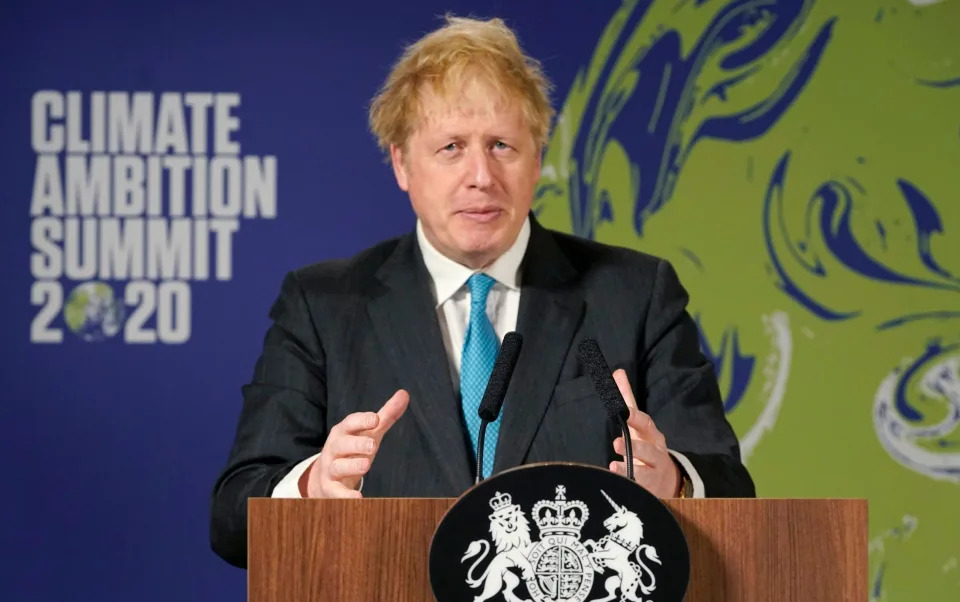
Boris Johnson and other ministers hoped his 10-point green plan would cement demand for electric vehicles - Freddie Mitchell/No10 Downing Street
His speech, the Government said, would put the UK on course to be the fastest G7 nation to decarbonise road transport.
Yet the new sales ban – described by the Society for Motor Manufacturers and Traders as “immensely challenging” – represented a huge gamble, with the potential to either turbocharge or tank Britain’s domestic car industry.
And astonishingly, for such a consequential policy, no detailed proposals to achieve it had actually been drawn up.
Instead, Johnson and other ministers hoped the stretching target would cement demand for electric vehicles, galvanising businesses to manufacture supplies and build the legions of chargers that would be required.
“It’s like the classic example of putting a man on the moon,” one former minister involved in the policy says.
“When Kennedy said ‘We’re going to put a man on the moon’, he did not know how they were going to get there. He just said this is the target – and they got there.”
Fast forward to today, however, and the scale of the undertaking has become clear.
Electric cars still remain unaffordable for most households, while a huge upgrade of the power grid will be needed in order to boost the number of vehicle chargers in Britain from 42,000 at present to the more than 300,000 being sought by ministers.
Meanwhile, to serve demand for vehicles domestically, around five battery “gigafactories” are needed in the UK – with hundreds of thousands of industry jobs at risk if they are not secured.
Experts say we are now at a crossroads. A report published this week by the Climate Change Committee, the statutory net zero watchdog, said that rising electric car sales were promising but work to build chargers “now needs to scale up more quickly”.
Separately, industry leaders say time is running out for Britain to secure the gigafactories that will be the bedrock of its future car manufacturing base. A failure to do so, while sticking with the 2030 ban on new petrol car sales, threatens a jobs bloodbath.
As the clock ticks down, alarm is growing that Britain will simply not be ready for 2030 – and a delay is increasingly likely.
Mon, 24 July 2023

Net Zero Electric Car
With Tory backbenchers demanding a rethink on Britain’s net zero policies, Rishi Sunak gave a less than convincing answer when challenged over one of the Government’s signature pledges.
A ban on the sale of new petrol and diesel cars is due to come into effect from 2030, having been announced with much fanfare by the Prime Minister’s predecessor Boris Johnson.
But when asked whether he would stand by the plan on Monday, Mr Sunak equivocated.
“Of course net zero is important to me,” he said. “So yes we’re going to keep making progress towards our net zero ambitions and we’re also going to strengthen our energy security.
“I think the events over the last year or two have demonstrated the importance of investing more in home-grown energy, whether that’s more nuclear or offshore wind. I think that’s what people want to see and that’s what I’m going to deliver.”
The comments have set the set the stage for a major U-turn, although Downing Street has insisted the 2030 ban remains official policy.
It is the latest twist in a saga going back to Mr Johnson’s premiership.
With a year to go before Britain hosted the Cop26 climate conference, Boris Johnson was preparing to make an eye-catching announcement.
The then-prime minister was poised to set out his 10-point plan to spark a green industrial revolution – and the centrepiece was a vow to ban the sale of new petrol and diesel cars by 2030.
A highly ambitious target, this was five years sooner than the deadline he had set just nine months earlier, which car industry bosses dismissed as “a date without a plan”.
It was also a decade before the target outlined by his predecessor, Theresa May, only two years beforehand.
“Our green industrial revolution will be powered by the wind turbines of Scotland and the northeast, propelled by the electric vehicles made in the Midlands and advanced by the latest technologies developed in Wales, so we can look ahead to a more prosperous, greener future,” Mr Johnson said in November 2020.

Boris Johnson and other ministers hoped his 10-point green plan would cement demand for electric vehicles - Freddie Mitchell/No10 Downing Street
His speech, the Government said, would put the UK on course to be the fastest G7 nation to decarbonise road transport.
Yet the new sales ban – described by the Society for Motor Manufacturers and Traders as “immensely challenging” – represented a huge gamble, with the potential to either turbocharge or tank Britain’s domestic car industry.
And astonishingly, for such a consequential policy, no detailed proposals to achieve it had actually been drawn up.
Instead, Johnson and other ministers hoped the stretching target would cement demand for electric vehicles, galvanising businesses to manufacture supplies and build the legions of chargers that would be required.
“It’s like the classic example of putting a man on the moon,” one former minister involved in the policy says.
“When Kennedy said ‘We’re going to put a man on the moon’, he did not know how they were going to get there. He just said this is the target – and they got there.”
Fast forward to today, however, and the scale of the undertaking has become clear.
Electric cars still remain unaffordable for most households, while a huge upgrade of the power grid will be needed in order to boost the number of vehicle chargers in Britain from 42,000 at present to the more than 300,000 being sought by ministers.
Meanwhile, to serve demand for vehicles domestically, around five battery “gigafactories” are needed in the UK – with hundreds of thousands of industry jobs at risk if they are not secured.
Experts say we are now at a crossroads. A report published this week by the Climate Change Committee, the statutory net zero watchdog, said that rising electric car sales were promising but work to build chargers “now needs to scale up more quickly”.
Separately, industry leaders say time is running out for Britain to secure the gigafactories that will be the bedrock of its future car manufacturing base. A failure to do so, while sticking with the 2030 ban on new petrol car sales, threatens a jobs bloodbath.
As the clock ticks down, alarm is growing that Britain will simply not be ready for 2030 – and a delay is increasingly likely.
Carbon cost
The UK’s commitment to reach “net zero” carbon emissions by 2050 will require emissions from vehicles to be almost eradicated.
Surface transport, including cars, accounts for the biggest chunk of Britain’s annual carbon emissions, representing 23pc last year.
This was about 105 million tonnes of carbon dioxide equivalent, the Climate Change Committee’s latest report says, which was 3pc up from 2021 but 8pc below pre-pandemic levels.
The reduction was mostly down to increased working from home, rising fuel prices and so-called low-traffic neighbourhoods, with a small contribution from rising electric vehicle sales.
But a crunch point is fast approaching at which sales of electric cars – which have much lower lifetime emissions than petrol ones – will need to do more of the heavy lifting.
Petrol cars tend to have lifespans of around 14 years, says Mike Hawes, chief executive of the Society of Motor Manufacturers and Traders (SMMT).
“So immediately that says, well, you’ve got to stop selling internal combustion engine (ICE) cars by 2035, to be able to have most off the road by 2050 and deliver net zero,” he adds.
This 2035 target was effectively adopted earlier this year by the European Union, while Denmark has joined the UK in proposing a more ambitious target of 2030. Norway, where eight in 10 cars bought are already electric, is aiming for a 2025 phaseout.
The UK’s own target had initially been 2040 but this was then changed twice by Boris Johnson, who had a longstanding passion for green issues and was encouraged by his now-wife Carrie Symonds.
Johnson thought Britain could steal a march on the rest of the world by pushing car companies to go electric sooner, by 2030, according to his former allies in government.
“Boris was a great directional leader. He was really good at painting a vision and saying ‘Let’s get there, I don’t care how we get there but let’s get there,’” says one minister who was involved in discussions.
“It would force you to think of how to do it.”
In at least that respect, the policy had immediate effects. Industry groups quickly warned a “Herculean effort” would be required, with the SMMT claiming success would “depend on reassuring consumers that they can afford these new technologies, that they will deliver their mobility needs and, critically, that they can recharge as easily as they refuel”.
Crucially, however, car companies secured an important concession. The sale of hybrid cars – which are part petrol, part battery-powered – would still be allowed until 2035.
This went against the Climate Change Committee’s recommendation that all carbon-emitting cars be phased out by 2032 at the latest. But it gave a stay of execution to several car plants, most of which were soon to produce only hybrids anyway.
Honda and Ford had both warned that job losses could result from an earlier hybrid ban, the Guardian reported. Honda closed its Swindon plant in 2021.
Since then, the Department for Transport has set out proposals for the so-called zero-emission vehicle (ZEV) mandate, which sets quotas for how many electric cars manufacturers must sell.
This would start at 22pc next year and gradually rise annually to reach 52pc by 2028 and 80pc by 2030.
“We’re up for the challenge, but we need to ensure we’re using every lever to move that market and encourage people to make the shift,” says Hawes.
Prohibitive pricing
By far the biggest thing that puts many drivers off buying an electric car is cost.
The top-selling EVs in Britain last year were Tesla’s Model Y and Model 3, which cost about £45,000 and £43,000 respectively, registration statistics show.
Next was Kia’s Niro and Volkswagen’s ID.3, both starting at about £37,000, and market stalwart the Nissan Leaf, which starts at £29,000.
The cheapest four-seater available is the MG4 EV, a Chinese model, at £27,000.
Yet all these remain far more expensive than the lowest-priced petrol cars, with the Dacia Sandero costing about £12,600, the MG3 £13,300 and Kia Picanto £13,400.
“We badly need the cost of electric cars to come down,” says Simon Williams of the RAC.
Like heat pumps, an electrically powered heating solution that the Government has backed to replace gas-fired boilers, proponents often argue that the running costs of EVs are actually cheaper than petrol cars.
Yet the upfront costs remain prohibitive for most families, similarly because the technology is not as mature as the fossil fuel-powered alternatives.
In the case of EVs, the biggest reason for this is the cost of batteries – the most expensive components that go into them.
The Climate Change Committee has said lower battery prices are essential to wider EV uptake, but has flagged this as an issue that is now “slightly off track”.
After a steady decline previously, prices increased in 2022 as global markets were convulsed by supply chain disruptions caused by the aftermath of the pandemic and the war in Ukraine, pushing up the costs of essential metals and other materials.
Meanwhile, although it remains cheaper to run an electric car than a petrol one if you charge it at home, rising electricity prices have made battery power less competitive for those who rely on public chargers.
This disparity is worsened by unequal rates of VAT, as well. Those who charge at home pay a rate of just 5pc, while those who charge using public infrastructure pay 20pc.
Another cost will come in 2025, when electric vehicles lose their exemption from vehicle excise duty under changes announced by the Chancellor Jeremy Hunt in his Autumn Statement last November.
One way of making electric cars more affordable is a salary sacrifice scheme, which allows workers at some companies to lease vehicles and pay out of their gross salary – ensuring it is tax-efficient.
Fiona Howarth, chief executive of Octopus Energy’s electric vehicles business, which leases company cars, says her company works with more than 3,000 businesses and has already leased 10,000 cars since setting up two years ago.
It has secured £650m in funding from investors, with around £400m committed so far.
“Salary sacrifice and other company car schemes are a very popular route for EVs,” she says, “because salary sacrifice actually makes it cheaper on a monthly basis to go for an electric car, versus the petrol or diesel equivalent – and that’s before any fuel saving.”
Those who charge at home can save another £1,000 a year in fuel, Howarth adds. “So that makes it very attractive to make the switch.”
One of the problems for buyers in recent years has been availability, as demand outpaced supplies. Some market players have successfully scaled up output, such as Tesla, which went from producing 100,000 cars in 2017 to 1.4m in 2022.
By comparison, German behemoth Volkswagen said it delivered 572,000 EVs that year but was nursing another 310,000 backorders in western Europe alone as supply chain problems crimped output.
“There is just soaring demand for EVs, and the manufacturers are now kind of scrambling to catch up,” Howarth adds.
Customers who order some upmarket brands can expect to wait as long as two and a half years, while last year it was common to wait nine to 12 months for other models.
This is one drawback of the more affordable Chinese makes, which must be shipped to Europe and are generally being directed first towards bigger, left-hand drive markets rather than right-hand ones such as Britain.
“The Chinese brands are the most affordable EVs on the market at the moment with very good range, and they’re very popular cars,” Howarth says.
“And they have had challenges keeping up with some of that demand.”
Overall, EVs represented 17pc of new car sales in 2022, ahead of what the Climate Change Committee says is necessary at this stage to hit net zero.
One catch, however, is that the new car market remains 30pc smaller than in 2019.
Most experts agree that almost equally as important to the wider rollout of EVs is the more affordable second hand market, which remains tiny. Only 1pc of these sales were EVs in 2022, with Autotrader listing only 20,000 electric cars on Friday compared to more than 425,000 petrol, diesel and hybrid cars.
Meanwhile, amid rising cost of living pressures, there are fears that customer appetite is suffering.
VW this week scaled back EV production at one of its German plants, with the car maker’s works council blaming “strong customer reluctance”. Contributing factors included falling subsidies, surging inflation and long delivery times.
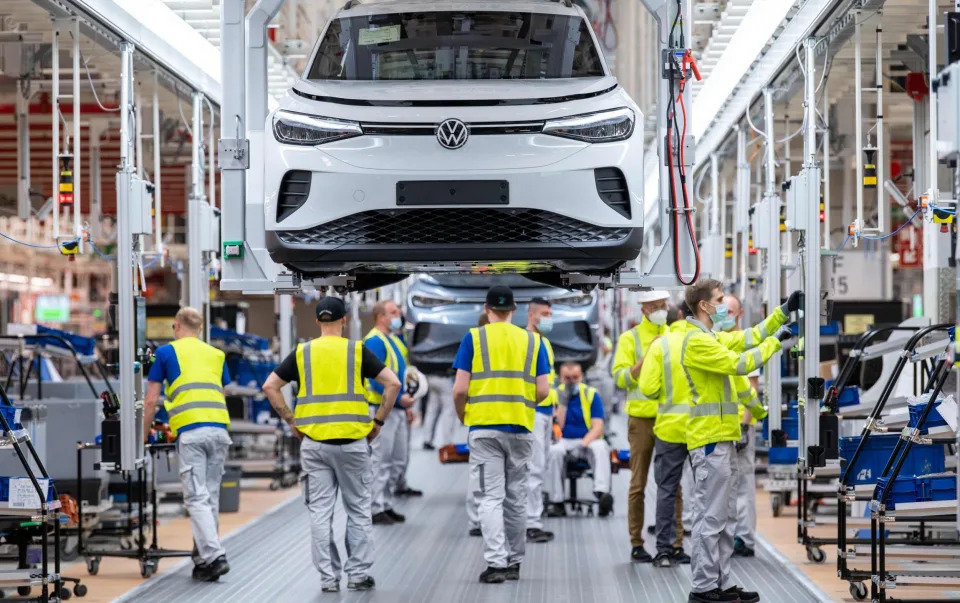
Volkswagen is cutting electric car production at one of its biggest factories after ‘strong customer reluctance’ led to lower sales than expected - David Hecker/AFP
Olaf Lies, a politician who sits on the council, said the decision represented a “warning signal for the industry”.
“The registration figures for electric cars remain high, but what we are concerned about is the current dip in demand – and not just at Volkswagen, but at all manufacturers,” he said.
Patchy progress
Another major concern many drivers have about electric cars is “range anxiety” – the fear their vehicle could run out of battery with no chargers nearby.
Grant Shapps, who was transport secretary when the 2030 policy was announced and is now Energy Secretary, is an electric car driver himself and recognised the need to tackle range anxiety straight away, a colleague says.
In response, the Government has pledged £1.6bn towards expanding the UK’s charge point network as part of plans to reach at least 300,000 chargers by 2030, or roughly 430 chargers per 100,000 people. By that point, it is expected there will be as many as 10 million EVs on the road.
“No matter where you live, we’re powering up the switch to electric and ensuring no one gets left behind in the process,” Shapps said in March 2022.
However, progress so far has been patchy. There are currently about 40,000 chargers in the UK, including almost 8,000 “rapid” ones capable of charging a car from 20pc to 80pc battery in about half an hour, according to official data.
These are unevenly distributed, however, with the bottom fifth of local authorities providing just 20 chargers per 100,000 people compared to 55 across England and 134 in the top fifth of authorities.
Roughly one in 20 chargers was also out of service last year and consumers must navigate as many as 20 different providers. The Government is also behind on its target to have six rapid chargers at every motorway service area in England by the end of this year, with less than a quarter of 119 sites reviewed by the RAC meeting this requirement.
This is vitally important, argues the RAC’s Williams. “Day to day driving in an electric vehicle is actually easy, because most people don’t drive that many miles every day,” he says.
“It’s only really when you start to make journeys beyond the range of your vehicle that you’re going to need to recharge on a journey. And you’ll want to do that as quickly as possible.
“While early adopters have been willing to plan their journeys to take a little bit longer, everyday drivers won’t want to do that.”
A large number of new chargers are in the pipeline, with charging companies having committed £6bn towards building them by 2030. But the Climate Change Committee has still raised questions over whether the pace of change is fast enough.
Ian Johnston, the chief executive of charge point company Osprey and chairman of industry body ChargeUK, claims provision is generally good and that bad patches these days are the exception rather than the rule.
“If you look at what the private sector is doing and what private landlords are doing, we’re seeing a phenomenal deployment of charging,” he says, pointing to a growing number of supermarkets, workplaces and residential streets where they can now be found.
According to ChargeUK, March and April were the best ever months for installations, with more than 2,000 chargers installed in both, a 75pc increase on a year ago.
However, the industry needs to build about double that amount every month on average to hit the Government’s target.
And this growth is chafing against physical constraints, says Johnston. For example, getting one of the regional power grid operators to connect charge points to the electricity grid is often delayed due to a lack of engineers, while the process of obtaining planning consent in many areas often drags on.
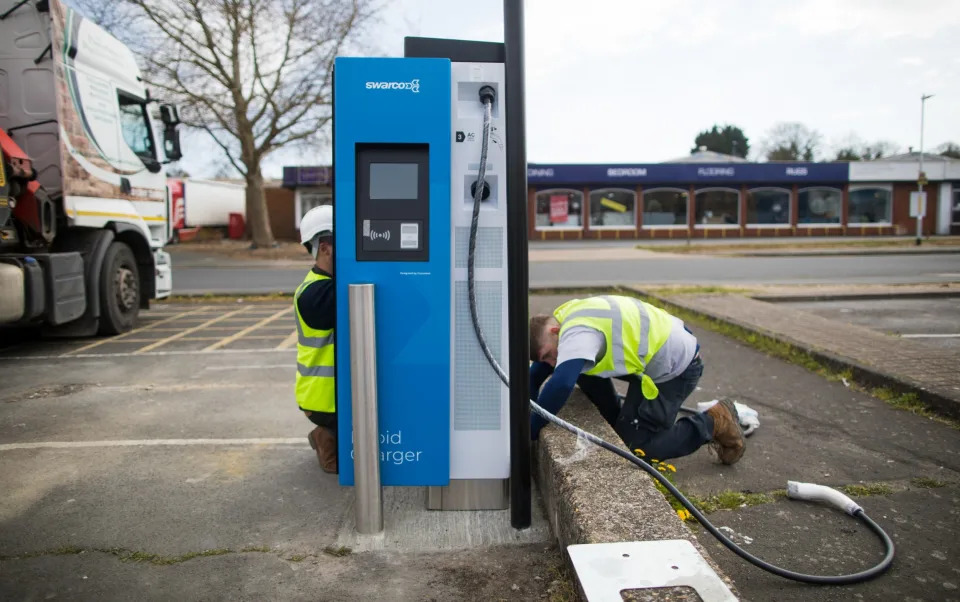
The Government has pledged ambitious plans to reach at least 300,000 chargers by 2030 - Chris Ratcliffe/Bloomberg
Charging prices are also still on the rise. Since September 2021, the cost of using an “ultra rapid” public charger has more than doubled from 34.2 pence per kilowatt hour to 74.2 pence, according to the RAC.
The average cost per mile currently is 10 pence if using a home charger and about 20 pence if using public chargers, compared to about 16 pence per mile for a petrol car that does 40 miles to the gallon, the RAC’s Williams says.
The RAC, the SMMT and electric car advocates want Jeremy Hunt to lower the rate of VAT on public charging to 5pc, so that drivers who do not have off-street parking at home are not unfairly penalised.
“That way, you have a level playing field for all EV drivers,” adds Williams.
In future, with experts predicting that a proliferation of wind and solar power will cause electricity prices to tumble, the environment may also become far more competitive – and tougher – for the many charging providers as the amount they can charge plunges.
“There’s absolutely going to be consolidation,” says Osprey’s Johnston. “Every month you’ve got hundreds of millions going into new charging providers, so there are going to be winners and losers.”
Looming behind all of this is also the question of whether the National Grid can upgrade the country’s electricity system, to make it ready for millions of EVs all charging overnight.
The Grid estimates that by 2030, peak demand for electricity – including EVs – will reach up to 68.5 gigawatts, up from 58.8 gigawatts in 2021.
In terms of throughput, the network will need to carry 38.3 terawatt hours of electricity related to electric cars per year by then, compared to just 2 terawatt hours last year.
Lawrence Slade, chief executive of Energy Networks Association, which represents the UK’s energy network operators, says this will be a “huge undertaking”.
“We’re helping to connect hundreds of thousands of electric vehicle charging points to the networks,” he says, “but there is a significant challenge.”
About 164 gigawatts of connection requests were received in the year to October 2022 – more than twice the entire grid’s worth of capacity.
Factories of the future
With more than 40m vehicles registered to UK owners today, a figure that includes about 35m cars and five million vans and trucks, perhaps the biggest challenge still facing Britain is a manufacturing one.
Only about one million EVs are registered.
At the moment, the car industry employs around 814,000 people, including 169,000 who work in manufacturing according to the SMMT.
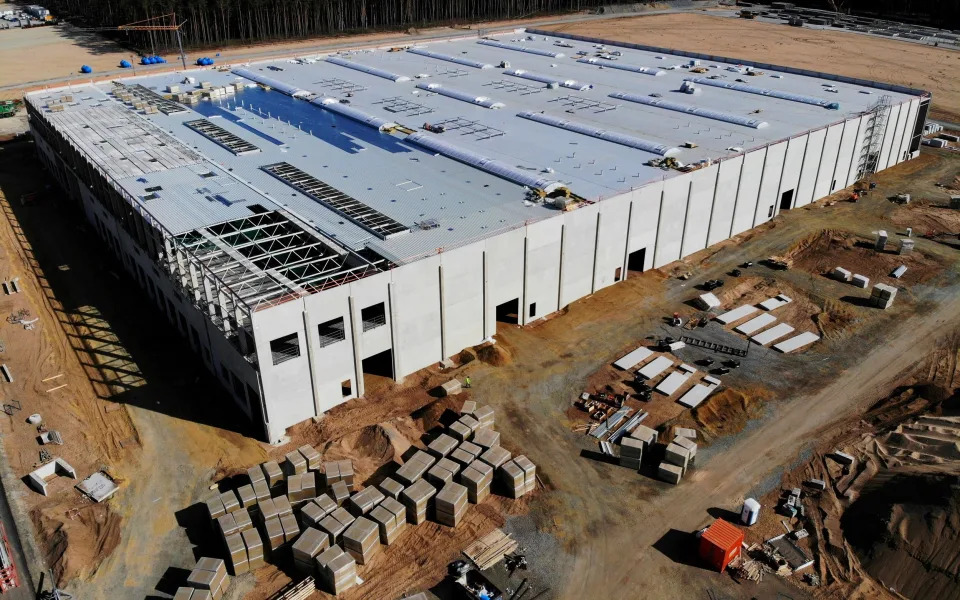
Tesla's gigafactory in Berlin opened in 2022 and can deliver 4,000 Model Y cars in a week - REUTERS/Hannibal Hanschke/File Photo
Since the 2030 target was announced, one of the biggest worries has been whether this totemic industry can survive in an electrified world.
According to the Faraday Institution, Britain needs roughly five battery gigafactories to meet domestic demand for electric cars. These factories are seen as crucial, because all other parts of the EV supply chain will orbit them.
So far, the UK has only secured one for certain, at the Nissan factory in Sunderland. Another was due to be built at Blythe, by Britishvolt, but is now in doubt after the company’s collapse and subsequent rescue.
Jaguar Land Rover owner Tata Motors is said to be poised to announce a gigafactory in Somerset following promises of support from the Government, but that has yet to be officially confirmed and Spain has made a counterbid.
Car industry leaders have repeatedly warned that time is running out to secure these factories. Without them, the Faraday Institution has said that the domestic car industry will slowly wither away, as hybrid plants close.
Meanwhile, the 2030 ban has turned up the heat further on UK car makers who are already struggling with “rules of origin” rules – agreed with the EU as part of the Brexit deal – which mean they must also ensure most of their battery components are sourced here or on the Continent.
With Joe Biden’s Inflation Reduction Act luring many firms to the US and President Macron and Germany’s Olaf Scholz offering companies attractive subsidies, is Britain running out of time to sort this issue?
“It’s not too late yet,” says Hawes, of the SMMT. “But as I’ve said before, the window is closing.”
So how likely is success?
“I wouldn’t put a percentage on it, but I’m optimistic,” Hawes insists.
Deadline looms into view
With six and half years still to go, the ban on selling new petrol and diesel cars might still seem a world away.
But in reality, many decisions that could tilt the balance in or out of Britain’s favour need to be made today.
So far the system is keeping up, but a question remains over whether EV manufacturers and charging providers can navigate rising prices and supply chain delays while keeping momentum behind the transition.
Some MPs, including the former business secretary Sir Jacob Rees-Mogg, fear that the 2030 ban on new petrol cars will see Britain lose manufacturing to foreign countries, and have called on Rishi Sunak to push back the target.
One former minister says: “A lot of these targets are aspirational… There’s an element of just trying to get the thing going, and then working out the problems afterwards.
“I do think 2030 is ambitious, but it is not impossible.”
Boris Johnson’s desire for Britain’s EV revolution to be world-beating was always ambitious.
Now, as efforts to expand the charging network flounder, prices stay high and manufacturers struggle to develop a supply chain, it is looking ever harder to pull off.
SEE
https://plawiuk.blogspot.com/2023/07/uk-rishi-sunak-casts-doubt-on-2030.html
https://plawiuk.blogspot.com/2023/07/rishi-sunaks-net-zero-plans-in-doubt-as.html
https://plawiuk.blogspot.com/2023/07/uk-green-pledges-become-election.html
No comments:
Post a Comment